|
|
|
Sort Order |
|
|
|
Items / Page
|
|
|
|
|
|
|
| Srl | Item |
| 1 |
ID:
155497


|
|
|
|
|
| Summary/Abstract |
A state that enlists foreign fighters as extensions of its own military power confronts an acute principal-agent problem. While the state (principal) might benefit by delegating security responsibilities to foreigners (agents), it risks seeing its aims partially implemented, unfulfilled, or even subverted. For more than a century, the United States has attempted to mitigate this problem as it has raised, trained, and armed proxies to fight its small wars. But we find considerable variation in its approach across time and space. Why? Rationalist treatments of the agency problem face difficulty in accounting for this variation, as they focus on goal incongruity between the principal and agent. This downplays, if not ignores, the historical and social process that leads to different manifestations of goal incongruity. Thus, I propose a constructivist reworking of agency theory. I stress how the principal draws upon, and deploys, social knowledge to identify and manage the particular hazards that it believes its agent poses. Mining primary sources, I show that changing characterizations of local proxies—as either biologically or culturally flawed—led to different interpretations of the agency problem. In turn, this led American officials to adopt different approaches to mitigating it—ranging from outright paternalism to less direct tutelage.
|
|
|
|
|
|
|
|
|
|
|
|
|
|
|
|
| 2 |
ID:
186596
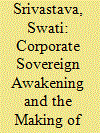

|
|
|
|
|
| Summary/Abstract |
The English East India Company's “company-state” lasted 274 years—longer than most states. This research note uses new archival evidence to study the Company as a catalyst in the development of modern state sovereignty. Drawing on the records of 16,740 managerial and shareholder meetings between 1678 and 1795, I find that as the Company grew through wars, its claim to sovereign authority shifted from a privilege delegated by Crown and Parliament to a self-possessed right. This “sovereign awakening” sparked a reckoning within the English state, which had thus far tolerated ambiguity in Company sovereignty based on the early modern shared international understanding of divisible, nonhierarchical layered sovereignty. But self-possessed nonstate sovereignty claimed from the core of the state became too much. State actors responded by anchoring sovereign authority along more hierarchical, indivisible foundations espoused by theorists centuries earlier. The new research makes two contributions. First, it introduces the conceptual dynamic of “war awakens sovereigns” (beyond making states) by entangling entities in peacemaking to defend sovereign claims. Second, it extends arguments about the European switch from layered sovereignty to hierarchical statist forms by situating the Company's sovereign evolution in this transformation. Ultimately, this study enables fuller historicization of both nonstate authority and the social construction of sovereignty in international politics.
|
|
|
|
|
|
|
|
|
|
|
|
|
|
|
|
| 3 |
ID:
093973


|
|
|
| 4 |
ID:
114088


|
|
|
|
|
| Publication |
2012.
|
| Summary/Abstract |
The success of norms constructivists rests in part on their assertion of academic activism as a heroic aspect of intellectual life. Critics of this vision, however, insist on the complicity of norm scholars in creating and maintaining processes of global injustice. Frustrated with this criticism, Richard Price calls for answers to a simple question: can detractors go beyond mere criticism and provide a praiseworthy target toward which norms constructivists can aim? We respond to this challenge, first, by offering an internal critique of Price's logic. We suggest that Price and other norms entrepreneurs underplay the darker, colonial side of modern ethical life on which the successes of norms cascades depend. Second, we draw on Adam Hochschild's King Leopold's Ghost to contrast contemporary norms constructivists with the heroic characters represented in and by this book. Norms entrepreneurs, Edmund Morel and Roger Casement, successfully exposed Belgian atrocities in colonial Congo, and Hochschild himself brings this mostly forgotten history to light. Yet the narrative trajectory of these three heroes is tragic, compelling each to face their complicity in the very forces they resist. This tragic vision calls us not to celebrate but to resist the continuing legacies of colonial domination.
|
|
|
|
|
|
|
|
|
|
|
|
|
|
|
|
| 5 |
ID:
158153


|
|
|
|
|
| Summary/Abstract |
This article compares the struggle of two groups in Israel for housing rights. Following Schneider and Ingram’s model, the article analyses the influence of the social construction of each group ‒ residents of the communal rural sector as an advantaged group, and public housing tenants as a dependent group ‒ on its housing rights. The findings fit Schneider and Ingram’s model with one surprising exception: The ‘dependent’ group achieved significant favourable legislation in 1998, whereas the ‘advantaged’ group has not yet succeeded. The article attempts to explain this divergence from the model and the effect of social construction on housing rights in a given society.
|
|
|
|
|
|
|
|
|
|
|
|
|
|
|
|
| 6 |
ID:
119999
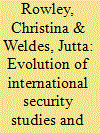

|
|
|
|
|
| Publication |
2012.
|
| Summary/Abstract |
Security studies is again reflecting on its origins and debating how best to study in/security. In this article, we interrogate the contemporary evolutionary narrative about (international) security studies. We unpack the myth's components and argue that it restricts the empirical focus of (international) security studies, limits its analytical insights, and constrains the sorts of interlocutors with whom it engages. We then argue that these limitations can at least partially be remedied by examining the performance of identities and in/securities in everyday life. In order initially to establish the important similarities between (international) security studies and the everyday, we trace elements of the evolutionary myth in Buffy the Vampire Slayer and Angel - which both stand in for, and are, the everyday in our analysis. We then argue that the Buffyverse offers a complex understanding of (identities and) in/security as a terrain of everyday theorizing, negotiation and contestation - what we call the 'entanglement' of in/security discourses - that overcomes the shortcomings of (international) security studies and its myth, providing insights fruitful for the study of in/security. In conclusion, we briefly draw out the implications of our analysis for potential directions in (international) security studies scholarship and pedagogy.
|
|
|
|
|
|
|
|
|
|
|
|
|
|
|
|
| 7 |
ID:
099489


|
|
|
|
|
| Publication |
2010.
|
| Summary/Abstract |
This article critically evaluates the writings of two well-known intellectuals, Ismay?l Hakk? Baltac?ogbrevelu (1886-1978) and Vacirclacirc Nureddin (Vacirc-Nucirc) (1901-1967), and seeks to assess the implications of social constructionism and biological essentialism for the formation of Republican woman's identity as presented in the works of these authors respectively. The central aim of the article is to reveal and re-appraise the patriarchal mentality underlying Turkish political and social thought by examining the connections between social constructionism and essentialism, as two main factors reinforcing gender inequality in the context of Turkish modernization and the nation-building process. Firstly, it is argued that the works of both authors reflect the dominant gender structure in Turkey, grounded on the subordinate position of women. Despite their divergent positions, neither of the authors provides openings for gender equality. Baltac?ogbrevelu advocates social constructionism emphasizing the socio-cultural at the expense of the natural during the identity formation process while Nureddin supports a biologically essentialist world view based on the "allotted" nature of the female. Baltac?ogbrevelu's social constructionism leads to gender (in)equality based on "sameness," within the contours of the public life whereas biological essentialism of Vacirc-Nucirc, signifies an ontological rejection of gender equality. Secondly, it is argued that both of the authors adopt a functionalist perspective emphasizing the reproductive function of women for men, family and nation and approach the issue of woman's identity within framework of the tradition-modernity continuum.
|
|
|
|
|
|
|
|
|
|
|
|
|
|
|
|
| 8 |
ID:
144038
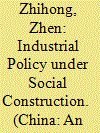

|
|
|
|
|
| Summary/Abstract |
The merger and acquisition (M&A) of Carlyle and Xuzhou Construction Machinery Group (XCMG) is an important takeover case between a foreign corporation and a leading Chinese enterprise in recent years that deserves the special attention of researchers interested in the Chinese political economy. This case involves multiple actors and a complicated institution environment. For the agreement to be reached, this M&A case required the approval of Xuzhou municipality, Jiangsu province and the central government of China. Regulatory authorities such as the State-owned Assets Supervision and Administration Commission of the State Council (SASAC), National Development and Reform Commission (NDRC) and Department of Foreign Investment Administration and Ministry of Commerce of China were also actively involved in the process. Moreover, the M&A activity of Carlyle–XCMG took place in the context of an important shift in China’s development strategy from “market in exchange for technology” to “independent innovation”. In accommodating the shift, the state administration adjusted its development-oriented ideologies towards “independent innovation”, which had had an impact on the M&A case of Carlyle and XCMG.
|
|
|
|
|
|
|
|
|
|
|
|
|
|
|
|
| 9 |
ID:
144037


|
|
|
|
|
| Summary/Abstract |
Not long ago, the Chinese economy was characterised by its labour-intensive industries. In the past 10 years, however, it has witnessed rapid industrial upgrading. The high-speed rail diplomacy, Alibaba’s historic initial public offering (IPO) and Xiaomi’s rapid rise to the third-largest smartphone producer in the world represent some latest developments. Both long-time China observers and Western mainstream media have begun to discuss Chinese innovation.
|
|
|
|
|
|
|
|
|
|
|
|
|
|
|
|
| 10 |
ID:
141194
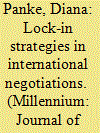

|
|
|
|
|
| Summary/Abstract |
There are hardly any instances of international negotiations, in which states do not at least partially recur to bargaining strategies. This article argues that bargaining power is ultimately a social construction, depending on perceptions about the plausibility of the realisation of a threat. Effective bargaining rests on the credibility of the threats made (e.g. no-vote, veto). Thus, even weak states can sometimes manipulate the threat-potential of seemingly more powerful actors and, thereby, punch above their weight in international negotiations. To trigger a loss of bargaining power, these states need to apply lock-in strategies that create linkages between the issue on the international negotiation agenda and other international or sub-level norms or policy commitments. Once such linkages are made, international-level bargaining threats of formerly powerful actors lose credibility as carrying them out would bring about severe reputation damages. This article distinguishes between different lock-in strategies and draws on three case studies (UNGA resolutions on African descend, on Myanmar, and on the Latin American Nuclear-Weapons-Free-Zone) to provide an empirical plausibility probe on the scope conditions under which the lock-in strategies are effective in reducing the power of seemingly strong actors in international negotiations.
|
|
|
|
|
|
|
|
|
|
|
|
|
|
|
|
| 11 |
ID:
096206


|
|
|
|
|
| Publication |
2010.
|
| Summary/Abstract |
Why are differences so political significant? Too often political science discussions of differences assume they are immutable. The attendant implication is that the political divisions attached to these variations-in religion, ethnicity, race, or any of the other dissimilarities that frequently enter political life-are considered rigid and inflexible. This commentary draws on recent work in moral and social psychology and evolutionary biology to suggest that the critical political factor surrounding differences is not their immutability but rather the moral and political salience we accord such differences. Simple experiments in social identity theory-and a conversation with an incensed 12-year old-demonstrate that the psychological process by which differences between people and groups become deemed ethically and politically relevant is totally socially constructed and hence can be restructured in a fashion that leads to more tolerant treatment of those judged different.
|
|
|
|
|
|
|
|
|
|
|
|
|
|
|
|
| 12 |
ID:
162856


|
|
|
|
|
| Summary/Abstract |
Schneider and Ingram introduced the pivotal theory of social construction of target populations in the American Political Science Review nearly 25 years ago. There, they developed four ideal type groups: advantaged, contenders, dependents, and deviants. They noted that there may be contention around the construction of the groups but implied an expectation of consensus. There has not been, however, a systematic categorization of politically salient target groups based on these categories, nor has there been an empirical assessment of whether or the extent to which consensus around the social constructions of salient target groups exists. We revisit this theory to offer a novel perspective and do so by leveraging advances in technology and methodological strategies. By crowdsourcing the task of evaluating the social construction of various target populations, we are able to assess underlying assumptions of theory as well as outline avenues for future research on policy design.
|
|
|
|
|
|
|
|
|
|
|
|
|
|
|
|
| 13 |
ID:
099496
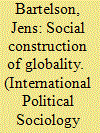

|
|
|
|
|
| Publication |
2010.
|
| Summary/Abstract |
Today the concept of globality is widely used to describe a condition characterized by the presence a single sociopolitical space on a planetary scale. Yet international relations theory has been either unwilling or unable to understand the global realm in sui generis terms. This paper argues that if we want to make coherent sense of the global realm and its relationship to the international system, we must account for how globality has been constructed as a social fact. The paper then tries to provide some of the foundations of such an account by analyzing how a distinctively global space was forged out of changing cosmological beliefs about the makeup of the terrestrial surface during the Renaissance, and how these new beliefs in turned conditioned the possibility of modern practices of territorial demarcation and national identity construction. If valid, this interpretation implies that the order of analytical priority between the international system of states and the global realm ought to be reversed, and hence also that a sui generis account of globality must be built on the recognition that the world was global well before it became international in any recognizably modern sense of this latter term.
|
|
|
|
|
|
|
|
|
|
|
|
|
|
|
|
| 14 |
ID:
099455


|
|
|
|
|
| Publication |
2010.
|
| Summary/Abstract |
Today the concept of globality is widely used to describe a condition characterized by the presence a single sociopolitical space on a planetary scale. Yet international relations theory has been either unwilling or unable to understand the global realm in sui generis terms. This paper argues that if we want to make coherent sense of the global realm and its relationship to the international system, we must account for how globality has been constructed as a social fact. The paper then tries to provide some of the foundations of such an account by analyzing how a distinctively global space was forged out of changing cosmological beliefs about the makeup of the terrestrial surface during the Renaissance, and how these new beliefs in turned conditioned the possibility of modern practices of territorial demarcation and national identity construction. If valid, this interpretation implies that the order of analytical priority between the international system of states and the global realm ought to be reversed, and hence also that a sui generis account of globality must be built on the recognition that the world was global well before it became international in any recognizably modern sense of this latter term.
|
|
|
|
|
|
|
|
|
|
|
|
|
|
|
|
| 15 |
ID:
190417


|
|
|
|
|
| Summary/Abstract |
While in the civil wars literature grievance is often considered as a cause of violent conflict, this paper investigates how grievances are meaningful to the people who experience violence, and how these meanings are expressed in everyday actions. Through the case of the Maoist conflict in India, in this paper I explore how grievance is socially constructed and related to action according to local people’s own narratives. This study reveals that perceptions of grievance are related not only to violent actions, but also to everyday strategies to resist violence and achieve durable peace and social change at the local level.
|
|
|
|
|
|
|
|
|
|
|
|
|
|
|
|
| 16 |
ID:
131759
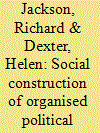

|
|
|
|
|
| Publication |
2014.
|
| Summary/Abstract |
This article proposes a general analytical framework for how we might better understand intrastate war and related forms of organised political violence. It begins by setting out our understanding of agency and structure, before outlining the key structures and agents central to the social construction of political violence. This is followed by a discussion of some of the common discursive practices frequently observed in the lead-up to the outbreak of organised violence, such as the widespread articulation of threat and victimhood narratives, the demonisation and dehumanisation of an enemy other, the renegotiation of norms of violence and the suppression of counter-hegemonic and anti-violence voices. The article argues that organised and sustained political violence is contingent on two key facilitating conditions. First, the presence of a particular set of material and discursive structures, including the military instruments for sustained violence, an economic basis for prosecuting war and a set of society-wide military norms, values and practices; and second, willing and capable agents who can transform the structural potential of the society or group into active participants in violence. The interaction of structures, agents and discursive practices can, in particular historical and spatial contexts, create the specific conditions which make organised violence possible. The discussion is illustrated by reference to a number of recent and historical wars, including the war on terror
|
|
|
|
|
|
|
|
|
|
|
|
|
|
|
|
| 17 |
ID:
099191


|
|
|
|
|
| Publication |
2010.
|
| Summary/Abstract |
Increasingly, scholarship on urban Africa has focused on the social construction of place in informal neighbourhoods. In this approach, researchers often highlight the fluidity, contingency, or creativity of the urban poor majority. Efforts to remake planning processes to work with or be driven by these informal everyday place-making strategies can be quite inspiring. Yet I question whether these ideas as put into practice in cities can be anything more than survival strategies of the abject poor. Historical-geographical roots and social relations with the state make each informal neighbourhood a particular case, and these factors have significant influence on people's capacity to make new, alternative statements with their urban places, or to create alternatives that might be replicated. This essay is based mainly around fieldwork in 2006-8 in Zanzibar's peri-urban West District shehia (locations) of Mwera and Welezo, including assessment of the built environments, interviews, archival work, and participant observation. I document ways in which these neighbourhoods are, despite newness, rooted in history and geography, and how residents' peri-urban everyday place making depends upon their relationships with the state. The internal heterogeneity of place making and social positioning proves difficult to contend with or deploy for alternative planning.
|
|
|
|
|
|
|
|
|
|
|
|
|
|
|
|
| 18 |
ID:
159195


|
|
|
|
|
| Summary/Abstract |
This article shows the power effects of Slovak development cooperation discourses. It focuses on how the Slovak population is constructed as ‘willing to help’, and the effects of this construction on the legitimation of the current regime and on the construction of the Slovak identity as developed. The article further shows the unequal relationship between ‘old’ and ‘new’ donors, how transition experience enables this relationship, and the power effects of the discourse of donor effectiveness in Slovakia.
|
|
|
|
|
|
|
|
|
|
|
|
|
|
|
|
| 19 |
ID:
094985
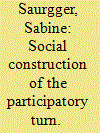

|
|
|
|
|
| Publication |
2010.
|
| Summary/Abstract |
At the beginning of the 1990s a new discourse emerged at the European Union level, insisting on the necessity of 'civil society' participation in decision-making processes. Based on a 'strategic-constructivist' research design, this article addresses the question of the emergence of this participatory turn in the official discourse and its transformation into a norm. It argues that the continued activism of an elite forum, consisting of political and administrative actors as well as academics, created the momentum that brought the concerned actors to accept the participatory norm and to play the roles required by it. However, due to internal competition amongst norm entrepreneurs, and a changed political situation, this norm is still contested, making it difficult to assess how its implementation will function.
|
|
|
|
|
|
|
|
|
|
|
|
|
|
|
|
| 20 |
ID:
125184


|
|
|
|
|
| Publication |
2013.
|
| Summary/Abstract |
Critics continue to debate the value of U.S. black music according to a flawed distinction between racial authenticity and social construction. Both sides have it half-right. Black music's value arose historically as the result of a fundamental contradiction in the logic of race tracing back to the slave era. As "Negro" in form, the music was constituted as the collective property of another property, a property-in-slaves. The incongruity produced a perception of black music as an auditory form embodied with fleshly substance, and this sense of racial feeling would live on despite its inconsistencies with modern ideas about race.
|
|
|
|
|
|
|
|
|
|
|
|
|
|
|
|
|
|
|
|
|